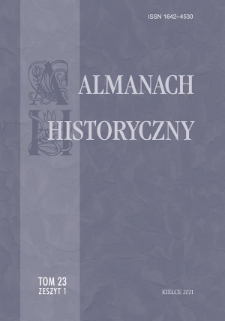Digital Library of the Jan Kochanowski University contains 13 466 digital objects
Object
Title: Taka gmina. Skargi mieszkańców na funkcjonowanie gminnej administracji wiejskiej wysyłane „do Warszawy” w latach siedemdziesiątych XX wieku
Creator:
Group publication title:
Abstract:
W PRL obywatele mający poczucie doznanych krzywd i niesprawiedliwości pisali lisy, skargi i donosy do centralnych organów państwa. Władze utworzyły biura zajmujące się obsługą przysyłanej korespondencji, które analizowały treści, przygotowywały specjalne biuletyny i podejmowały interwencje. Efektem działań sprawdzających było potwierdzenie przypadków niesprawiedliwości i ukaranie winnych. Dla władz korespondencja była cennym źródłem informacji o społecznych nastrojach, bolączkach i kwestiach wymagających rozstrzygnięć. Analizując korespondencję przychodzącą do Komitetu Centralnego Polskiej Zjednoczonej Partii Robotniczej oraz Polskiego Radia i Telewizji dotyczącą władz utworzonych w 1973 r. gmin udało się odnaleźć problemy, o których pisali mieszkańcy wsi. Ten bogaty materiał źródłowy pozwolił na przedstawienie opinii i ocen dotyczących funkcjonowania urzędów gminnych, naczelników gmin i lokalnej biurokracji. W listach wielokrotnie wzmiankowano o złej pracy niektórych urzędów, opieszałym i stronniczym procedowaniu. Wiele opinii dotyczyło najważniejszego urzędnika w gminie – naczelnika. Wielokrotnie ujawniano też przypadki amoralnych i patologicznych zachowań lokalnej biurokracji, a to łapownictwa, pijaństwa, kumoterstwa, wykorzystywania zajmowanego stanowiska dla czerpania różnych korzyści. Autorzy najczęściej opisywali własne perypetie, mając nadzieję na skuteczność interwencji. Wielokrotnie strategia pisania listów do centralnych władz w Warszawie była skuteczna. In the Polish People’s Republic the citizens, having the feeling of suffered wrongs and injustice, used to write letters, complaints and denunciations to the national central authorities. The authorities established the offices dealing with the arriving correspondence, analysing content of it, preparing special bulletins and taking interventions. Confirmation of cases of injustice and punishment of culprits were the effects of the checking activities. For the authorities the correspondence was a valuable source of information about the social moods, ills and problems to be resolved. After analysis of correspondence received by the Central Committee of the Polish United Workers’ Party and by the Polish Radio and Television concerning the authorities of the communes established in 1973, the problems described by the rural dwellers were successfully discovered. These rich source materials enabled to present opinions and assessments concerning functioning of the communal offices, heads of the communes and of the local bureaucracy. Bad work of some offices, slow and dilatory proceedings were repeatedly mentioned in the letters. Many opinions concerned the most important clerk in the commune – the head of it. Also cases of amoral and pathological behaviour of the local bureaucrats such as bribery, drunkenness, old-boy networks, using the position to gain different benefits from it were many times revealed. Most often the authors described their own problems and hoped that interventions would be effective. Many times the strategy of writing letters to the central state authorities in the capital city of Warsaw was successful.
Place of publishing:
Physical description:
ISSN:
Publisher:
Wydawnictwo Uniwersytetu Jana Kochanowskiego w Kielcach
Date issued:
Identifier:
oai:bibliotekacyfrowa.ujk.edu.pl:4471 doi:10.25951/4414
Language:
Is part of:
Has part:
Type:
Access rights:
Format:
Object collections:
- JKU Digital Library > University Publishing
- JKU Digital Library > University Publishing > Serial publications
- JKU Digital Library > University Publishing > Serial publications > „Almanach Historyczny”
Last modified:
Apr 3, 2025
In our library since:
Dec 30, 2021
Number of object content hits:
154
Number of object content views in PDF format
208
All available object's versions:
https://bibliotekacyfrowa.ujk.edu.pl/publication/4414

